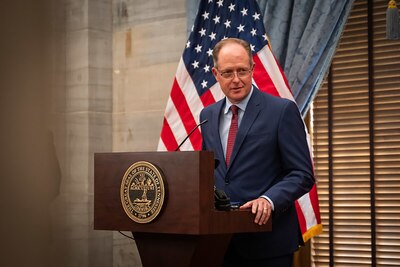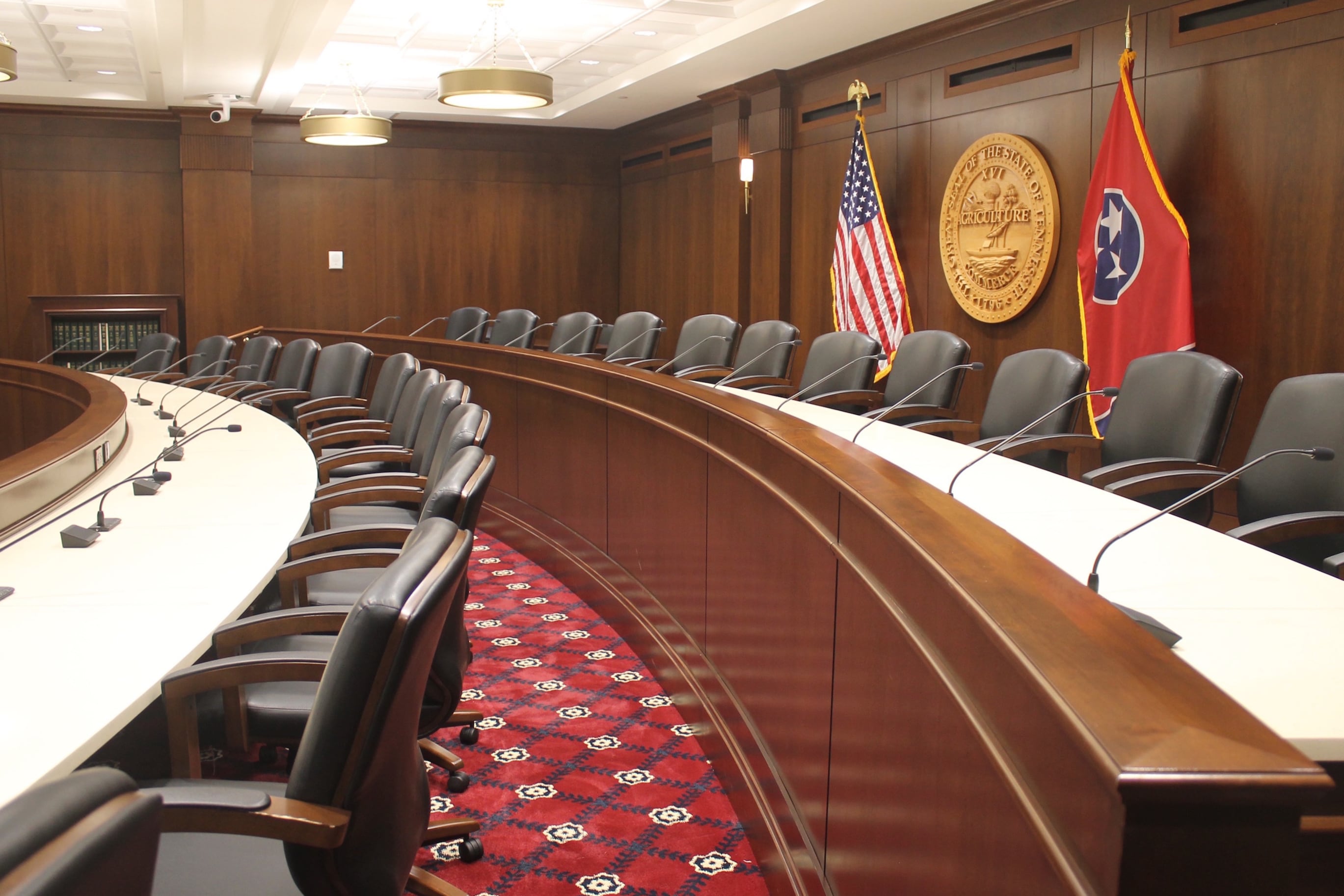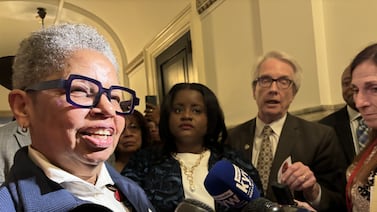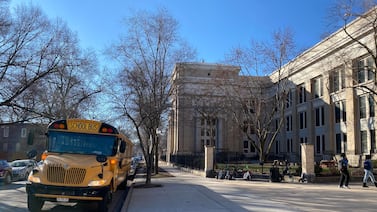Sign up for Chalkbeat Tennessee’s free daily newsletter to keep up with statewide education policy and Memphis-Shelby County Schools.
Tennessee Republicans are using a legislative maneuver to meet behind closed doors while crafting a statewide expansion of private school vouchers, putting into question whether the public will get ample time to review the legislation and weigh in.
To meet this week’s deadline to file legislation, Senate and House majority leaders Jack Johnson and William Lamberth submitted so-called caption bills that gave a brief description of the intentions of the full legislation that they’ll file later through amendments.
On Friday, neither legislative leader, nor the governor’ office, would say when they expect to unveil the full detailed proposal that’s been anticipated since November. That’s when Lee announced he would push to create a universal voucher program to offer public funding to families who choose to send their children to private schools or some home schools, regardless of family income or what county they live in.
The policy would mark a major change in Tennessee’s K-12 education structure, affecting students, parents, taxpayers, schools, districts, and communities across the state. Currently, vouchers are offered in three counties — Davidson, Hamilton, and Shelby — and only to low-income families.
But the lack of details for the proposed program — ranging from whether participating private schools must be state-accredited to whether participating students have to take the same state tests as public school students — worries some public education advocates. They are concerned the administration is focused on drafting language that will line up the most legislative votes, instead of crafting a research-based policy for release in time to fully study and vet the plan in public forums.
“This debate deserves to be held sooner than later and conducted in the light of day — not in back rooms at the Capitol,” said Gini Pupo-Walker, director of The Education Trust in Tennessee.
When the voucher amendment is introduced, public debate can kick off in legislative committees, and lawmakers can hear directly from their constituents about what parts of the proposal they like and don’t like.
But under House rules, for instance, a vote in a subcommittee can happen the day after an amendment is introduced.
Some voucher critics fear the legislative process could get rushed if the specifics are delayed for weeks, especially since the 2024 session was already expected to be shorter than last year’s session that ended on April 21. That’s because it’s an election year, when the seats of all 99 House members and half the Senate are up for grabs. Legislators can’t accept campaign contributions until they adjourn for the year.
It’s uncertain how much the bill will be amended from draft legislation that Johnson’s office said it accidentally filed earlier in the week, then quickly retracted.
RELATED: Tennessee universal school voucher bill draft drops. Here are 5 things that stand out
In a statement Friday, Johnson, the Senate majority leader from Franklin, said “it is important we get it right.”

“The governor has gone to great lengths to meet with stakeholders and experts to ensure the language is solid, reasonable, and consistent with Tennessee’s outstanding record of fiscal responsibility,” he said. “I look forward to presenting the proposal to my colleagues in the Senate soon.”
But House Democratic Caucus Chairman John Ray Clemmons, whose party opposes vouchers, offered a different explanation.
“They clearly don’t have the votes to pass this voucher scam, and they don’t want to file a bill until they have the votes to get it through the committee process,” said the Nashville lawmaker.
Governor’s proposal generates more questions than answers
Lee has shared his vision in broad terms for his Education Freedom Scholarship Act. The program would start with up to 20,000 students statewide who would get $7,075 next school year for private education services, with eligibility restrictions for half of those. Beginning with the 2025-26 school year, he wants all K-12 students to be eligible, with no eligibility restrictions.
But dozens of unanswered questions remain. Among them:
Will private schools that accept vouchers have to require state licensure for its teachers, in addition to a background screening, to ensure a certain level of professional qualifications and safety?
Will the governor seek to place stipulations on tuition costs and who can use vouchers at participating private schools? (There’s evidence that private schools have exploited similar programs in Arizona and Ohio by raising tuition rates or encouraging students already enrolled in private schools to apply for a government-paid voucher.)
Will the legislation mandate fiscal audits of the program?
Will the program be evaluated to gauge whether it’s leading to better academic outcomes than public schools?
Given the numerous restrictions lawmakers have placed on public school instruction and curriculum in Tennessee over the last decade, will participating private or home schools be allowed to teach anything they want?
Will language be included in the legislation to ensure private schools can’t discriminate against certain applicants, such as students with disabilities, or based on race, religion, or sexual orientation?
Will the legislation attempt to exclude undocumented students from eligibility, as Tennessee’s 2019 education savings account law did?
Caption bills can be helpful, or not
None of those questions are answered in the voucher bills filed on Jan. 31 in the House and Feb. 1 in the Senate.
Broadly written caption bills are an increasingly common tool used by Tennessee lawmakers and lobbyists.
Deborah Fisher, executive director of the Tennessee Coalition for Open Government, said caption bills can be useful — for instance, to address a sudden need such as in the middle of last year’s session, when changes to bolster school safety took on urgency after six people died in a mass school shooting in Nashville.
But caption bills can be abused, by not revealing a bill’s true purpose until it’s too late for the public to notice. They also can become a delaying tactic, allowing legislators to push through legislation in a session’s waning days before constituents can ask questions or opponents can mobilize against it.
In 2019, during Lee’s first year in office, his administration used a caption bill to introduce his education savings account proposal. The amendment that presented the details was filed in mid-March and, in an historic and controversial vote, a further amended version passed the full House less than six weeks later during a season when most school communities are consumed with state testing.
Fisher said there’s adequate time for a full and robust debate on Lee’s newest voucher proposal, “but not if it’s held back too many weeks.”
It takes time for information to filter out to citizens, Fisher added, especially for an issue as contentious and complex as vouchers.
“I think this governor would look better and serve our state better if he showed his hand and let people know the nuts and bolts,” she said.
Marta Aldrich is a senior correspondent and covers the statehouse for Chalkbeat Tennessee. Contact her at maldrich@chalkbeat.org.







